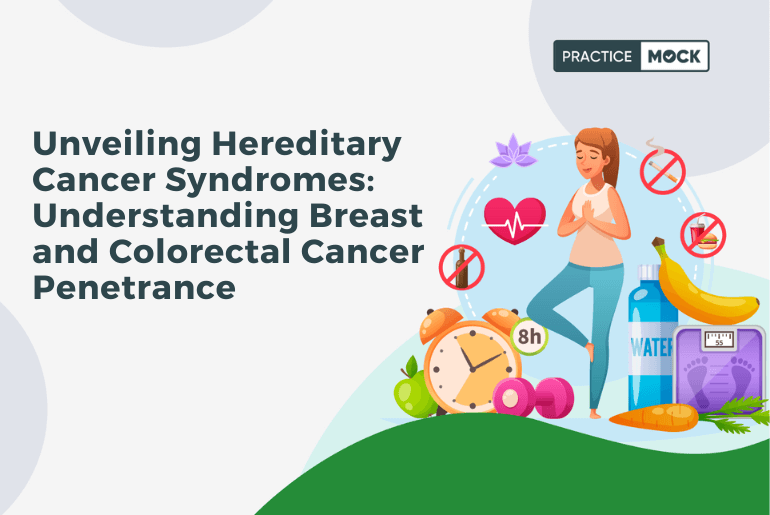

Cancer, a complex and often devastating disease, arises from a combination of genetic and environmental factors. In some cases, individuals may carry genetic mutations that significantly increase their risk of developing certain types of cancer. Hereditary cancer syndromes, such as those associated with breast and colorectal cancer, have garnered considerable attention in the field of oncology. One essential concept within these syndromes is penetrance, a factor that plays a pivotal role in assessing cancer risk and guiding preventive measures.
The Basics of Hereditary Cancer Syndromes
Hereditary cancer syndromes are genetic conditions that run in families and predispose individuals to specific types of cancer. These syndromes are often caused by mutations in specific genes that regulate cell growth and DNA repair. When these genes are altered, they can lead to an increased likelihood of cancer development.
Two of the most well-known hereditary cancer syndromes are those associated with breast and colorectal cancer. Mutations in the BRCA1 and BRCA2 genes are linked to a significantly increased risk of breast and ovarian cancer, while mutations in genes like APC and MLH1 are associated with hereditary colorectal cancer syndromes.
Understanding Penetrance
Penetrance is a crucial concept when discussing hereditary cancer syndromes. It refers to the likelihood that an individual carrying a specific genetic mutation will develop the associated cancer during their lifetime. Penetrance is often expressed as a percentage, indicating the proportion of mutation carriers who will go on to develop cancer.
For example, in the case of BRCA1 and BRCA2 mutations, the penetrance for breast cancer is relatively high. This means that a significant percentage of individuals carrying these mutations will develop breast cancer at some point in their lives. However, it’s important to note that penetrance can vary widely among different genetic mutations and syndromes.
Incomplete Penetrance: A Complex Phenomenon
Incomplete penetrance is a term used when not all individuals with a specific genetic mutation develop the associated cancer. In other words, some mutation carriers may remain cancer-free throughout their lives, even though their genetic predisposition suggests otherwise.
The factors contributing to incomplete penetrance are multifaceted and not yet fully understood. Environmental factors, lifestyle choices, and other genetic modifiers may influence whether a mutation carrier ultimately develops cancer. Additionally, advances in genetic research have revealed that not all mutations within a specific gene carry the same level of cancer risk, further complicating the picture.
Implications for Screening and Prevention
Understanding penetrance is of paramount importance when it comes to cancer screening and prevention strategies. High-penetrance mutations, such as those in BRCA1 and BRCA2, often warrant more aggressive screening and preventive measures, such as prophylactic surgeries or intensive surveillance.
Conversely, for mutations with lower penetrance or incomplete penetrance, the decision-making process becomes more complex. Physicians and genetic counselors must carefully assess an individual’s family history, genetic profile, and other risk factors to determine the most appropriate screening and prevention plan. This may involve more frequent screenings, lifestyle modifications, or chemoprevention strategies.
The Role of Genetic Counseling and Testing
For individuals with a family history of hereditary cancer syndromes or those who carry known cancer-associated mutations, genetic counseling and testing are invaluable tools. Genetic counselors can provide personalized risk assessments, facilitate genetic testing, and offer guidance on preventive measures.
It’s important to note that genetic testing is not a one-size-fits-all approach. The decision to undergo genetic testing should be made after careful consideration of individual circumstances, family history, and the potential emotional and psychological impact of the results.
Future Directions in Hereditary Cancer Research
As our understanding of genetics and cancer continues to evolve, researchers are working to refine penetrance estimates and uncover the intricate mechanisms underlying incomplete penetrance. This ongoing research holds promise for more precise risk assessments and tailored preventive strategies.
In conclusion, hereditary cancer syndromes, such as those linked to breast and colorectal cancer, are complex and multifaceted conditions. Penetrance, the likelihood of cancer development in mutation carriers, plays a central role in shaping screening and prevention approaches. As research advances, our ability to provide individuals with personalized risk assessments and targeted interventions will continue to improve, ultimately enhancing our ability to prevent and manage hereditary cancer syndromes.
Recent Posts
How to Prepare IBPS RRB Clerk 2025 Exam At Home?
Here we are providing some strategy to prepare IBSP RRB Clerk exam at home, check…
Box Based Puzzles for RRB PO 2025, Check How to Solve in 5 Minutes?
In this article, we are providing the Box-Based Puzzles for RRB PO 2025, Candidates can…
Reasoning for SSC CGL Best Preparation Strategy, Download Free PYQs
In this blog, we have provided the questions and topic-wise tests of reasoning for SSC…
Smartest RBI Grade B Exam Preparation Strategy for Phase 1 & 2
Master your RBI Grade B 2025 preparation with the smartest study schedule for Phase 1…
IBPS Clerk Cut Off 2025, Check Previous Year Cutoff Marks
IBPS Clerk Mains Cut Off 2025 will be released on their official website. Candidates can…
RBI Grade B Course 2025, Check Best Online Coaching
Choose the best online courses for RBI Grade B 2025. Improve your preparation with expert…


